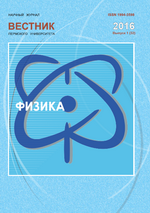Polarization and electrical conductivity of some engine oils as disperse systems
DOI:
https://doi.org/10.17072/1994-3598-2016-1-43-50Abstract
The main characteristics of engine oil are viscosity and an index of viscosity. Viscosity of oil η and its specific electric resistance is correlated with each other. Therefore their simultaneous research is of interest. Considering that fact that this communication is still insufficiently studied, and the electric equipment is constantly improved, the experimental study of four synthetic engine oil of the Castrol, Shell and Ravenol companies is undertaken. In the range of temperatures from 40 to 100 °C conductivity, polarization and dielectric losses were measured. It was supposed that all oils represent dispersion medium in which into dispersive environment (basic oil) as ideal dielectric in the form of disperse phases is introduced additives part from which are ionogenic. All oils are unpolar dielectrics with exponential increase in specific electric conductivity from 17–130 nS/m at 40 °C to 0.18–1.12 mcS/m at 100 °C. Dispersion of dielectric permitivity with frequencies below 10 kHz is caused by electrode polarization. Energy of activation of specific electric conductivity γ in a temperature interval for all oils is in area 0.35–0.40 eV and is defined not only viscosity of the dispersion medium, but also energy of dissociation of ionogenic additives.Received 14.01.2016; accepted 03.03.2016References
Izmestiev I. V., Konyaev S. A. Change of dielectric properties some engine oils at their destruction. Bulletin of Perm University. Series: Physics. 2012, no. 1 (19), pp. 85–90. (In Russian).
Izmestiev I. V., Novikov V. V. Examination of engine oil on the basis of experiment data and modelling of its dielectric properties. Bulletin of Perm University. Series: Physics. 2013, no. 1 (23), pp. 84–87. (In Russian).
Izmestiev I. V., Novikov V. V. Kinetics of formation carbon backbone chains in a medium of engine oil at its operation according to magnetic relaxation of protons. Bulletin of Perm University. Series: Physics. 2014, no. 1 (26), pp. 13–16. (In Russian).
Shchukin E. D., Pertsov A. V., Amelina E. A. Kolloidnaya khimiya (Colloidal chemistry). Moscow, Vysshaya shkola, 2004. 445 p. (In Russian).
Tareev B. M. Fizika dielektricheskich materialov (Physics of dielectric materials). Moscow: Energoizdat. 1982. 320 p. (In Russian).
Borisova M. E., Koykov S N. Fizika dielektrikov (Physics of dielectrics). Leningrad: Leningrad State University, 1979. 240 p. (In Russian).
Baltenas R., Safonov A. S., Ushakov A. I., Shergalis V. Motornye masla (Engine oils). Moscow: Al-faLab, 2000. 272 p. (In Russian).
Kittel Ch. Introduction to Solid State Physics, 8th ed. New-York.: Wiley, 2004. 704 p.
Damaskin B. B., Petriy O. A. Vvedenie v elektrokhimicheskuyu kinetiku (Introduction to the electrochemical kinetics), 2nd ed.
Moscow: Vysshaia shkola, 1983. 400 p. (In Russian).
Frenkel J. Kinetic theory of liquids. Mineola: Dover Publications, 1955. 485 p.
Downloads
Published
How to Cite
Issue
Section
License
Автор предоставляет Издателю журнала (Пермский государственный национальный исследовательский университет) право на использование его статьи в составе журнала, а также на включение текста аннотации, полного текста статьи и информации об авторах в систему «Российский индекс научного цитирования» (РИНЦ).
Автор даёт своё согласие на обработку персональных данных.
Право использования журнала в целом в соответствии с п. 7 ст. 1260 ГК РФ принадлежит Издателю журнала и действует бессрочно на территории Российской Федерации и за её пределами.
Авторское вознаграждение за предоставление автором Издателю указанных выше прав не выплачивается.
Автор включённой в журнал статьи сохраняет исключительное право на неё независимо от права Издателя на использование журнала в целом.
Направление автором статьи в журнал означает его согласие на использование статьи Издателем на указанных выше условиях, на включение статьи в систему РИНЦ, и свидетельствует, что он осведомлён об условиях её использования. В качестве такого согласия рассматривается также направляемая в редакцию справка об авторе, в том числе по электронной почте.
Редакция размещает полный текст статьи на сайте Пермского государственного национального исследовательского университета: http://www.psu.ru и в системе OJS на сайте http://press.psu.ru
Плата за публикацию рукописей не взимается. Гонорар за публикации не выплачивается. Авторский экземпляр высылается автору по указанному им адресу.

